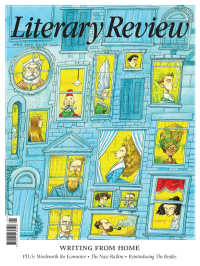Louise Foxcroft
Cruel Intentions
Strange Antics: A History of Seduction
By Clement Knox
William Collins 516pp £25
This rollicking account of a chaotic, cruel and dispiriting history opens with a 19th-century seduction case in which an older, apparently respectable man exploited and impregnated a fifteen-year-old girl in his care (the girl’s reputation, as in so many similar instances, was trashed). This is seduction as crime rather than desirous play, a public concern touching on questions of morality, philosophy, politics, class, race, gender and economics. It’s more than disheartening to realise how little has changed.
Clement Knox argues for an idea of seduction that emerged in the 18th century with the rise of ‘modernity’. Ovid, Christine de Pizan, Chaucer, Shakespeare et al are considered intellectually apart, distanced from us by post-Enlightenment ideas of liberalism, materialism and feminism. The seduction narrative fundamentally changed as passion and logic collided, creating two modern, intertwined forms: the ‘Villainous’, based on the exploitation of vulnerability, and the ‘Heroic’, relying on the power of reason and sensuality. The tension between these two forms is presented in a series of biographies that explore the difficult ‘grey zone of agency’.
By exposing such notorious rakes as Francis Charteris and his associates, Knox argues, William Hogarth in A Harlot’s Progress and Samuel Richardson in Pamela and Clarissa codified and popularised the modern concern with seduction, sparking a revolution in socio-sexual behaviours and attitudes. Charteris, whose ‘capacity for roguery’ was legendary, legged

Sign Up to our newsletter
Receive free articles, highlights from the archive, news, details of prizes, and much more.@Lit_Review
Follow Literary Review on Twitter
Twitter Feed
It wasn’t until 1825 that Pepys’s diary became available for the first time. How it was eventually decrypted and published is a story of subterfuge and duplicity.
Kate Loveman tells the tale.
Kate Loveman - Publishing Pepys
Kate Loveman: Publishing Pepys
literaryreview.co.uk
Arthur Christopher Benson was a pillar of the Edwardian establishment. He was supremely well connected. As his newly published diaries reveal, he was also riotously indiscreet.
Piers Brendon compares Benson’s journals to others from the 20th century.
Piers Brendon - Land of Dopes & Tories
Piers Brendon: Land of Dopes & Tories - The Benson Diaries: Selections from the Diary of Arthur Christopher Benson by Eamon Duffy & Ronald Hyam (edd)
literaryreview.co.uk
Of the siblings Gwen and Augustus John, it is Augustus who has commanded most attention from collectors and connoisseurs.
Was he really the finer artist, asks Tanya Harrod, or is it time Gwen emerged from her brother’s shadow?
Tanya Harrod - Cut from the Same Canvas
Tanya Harrod: Cut from the Same Canvas - Artists, Siblings, Visionaries: The Lives and Loves of Gwen and Augustus John by Judith Mackrell
literaryreview.co.uk